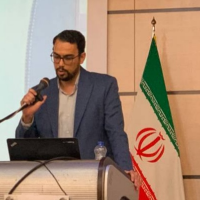Investigating the Challenges of question design (Istintaq) and solutions to complete it based on thematic interpretations of the Qur'an
Author(s):
Article Type:
Research/Original Article (دارای رتبه معتبر)
Abstract:
Thematic interpretation, as a solution proposed by Martyr Sadr for active confrontation with the Qur'an and discovering its theory on various topics and issues, has different levels, the main focus of which is question design (Istintaq). Despite the widespread acceptance of this approach by contemporary Qur'anic scholars and the production of many works with an interpretive approach, some shortcomings in it call into question the " Qur'anic nature of the researcher's efforts result." Despite the efforts of some experts to refine and complete this approach, due to the lack of focus on the focal points in the challenges of thematic interpretation, This article uses the methods of description, analysis and inference to the critical readings of the process of question design, and the proposed strategies for the fulfilment of Qur'anic theorizing have not been entirely successful. Passivity in the face of the issue and problem, lack of a comprehensive plan to refer to the whole Qur'an and failure to explain the position of Ahl al-Bayt in understanding the Qur'an are the three critical harms. There are three ways to eliminate these harms. First, before entering into interpretation, should present the paradigm of subject and issue to the Qur'an. Then, we should do the broad Quranic finding implication by reviewing all the Qur'an verses. Finally, for initial understanding of the verses and completing and developing the concepts resulting from the Qur'anic study and recognizing the relevant practical dimensions, refer to the narrations.
Keywords:
Language:
Persian
Published:
Tahqiqat-e Ulum-e Qur´an wa Hadith, Volume:19 Issue: 3, 2022
Pages:
51 to 73
https://www.magiran.com/p2512829
سامانه نویسندگان
مقالات دیگری از این نویسنده (گان)
-
اعتبارسنجی سندی و ارزیابی محتوایی زیارت وارث امام حسین (ع) در کتب زیارات و ادعیه شیعه
*، مهدی محمدی نژاد
نشریه دعاپژوهی، پاییز و زمستان 1403 -
Phonetic and Semantic Functions of Speech Rhythm in Understanding the Miraculous Nature of the Holy Qur’an:A Study in Light of Imam Khamenei’s Views on Familiarity with the Qur’an
Abbas Karimi, Seyyed Mahdi Rahmati*
Journal of Contemporary Quranic Studies, -
The Influence of Social-Cultural Background on the Presuppositions of the Quran Exegetes; Case Study: the Andalusian Commentators Interpreting the Verses of Wilāyah
Seyed Mahdi Rahmati *, Fardin Jamshidi Mehr, MuhammadAli Dolat
Journal of Quran, Culture and Civilization, -
"Human way of life" based on the principles of "human action" from Ayatollah Javadi Amoli's point of view
*, Mohammadjavad Vailzadeh
The Quarterly Journal of Islam and Social Studies,



